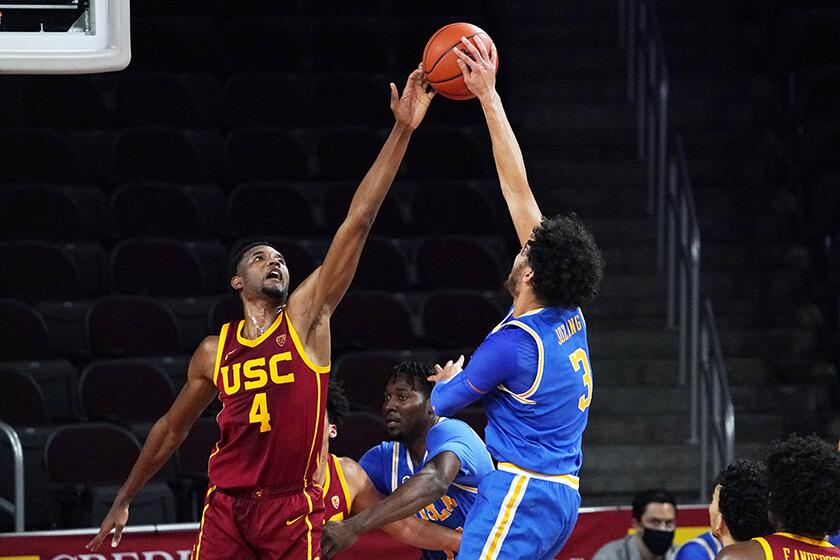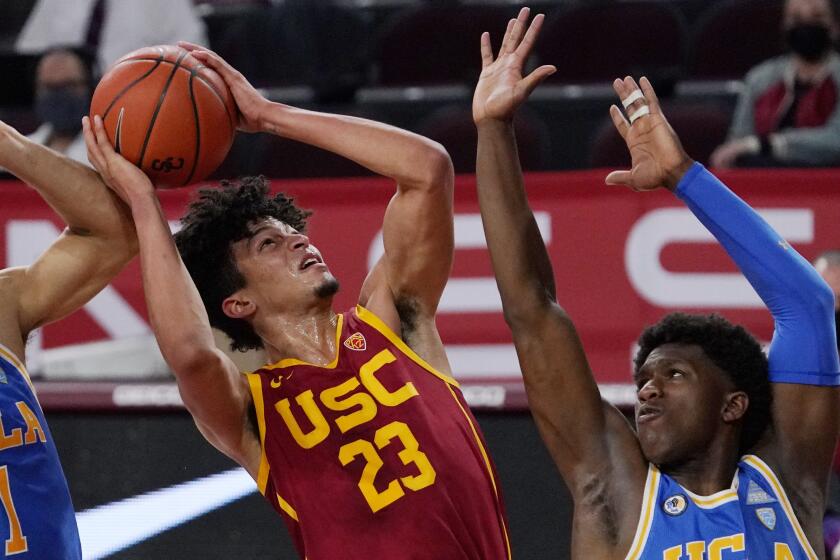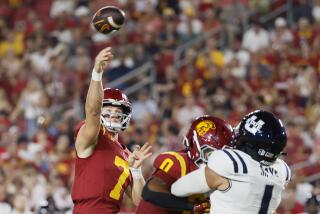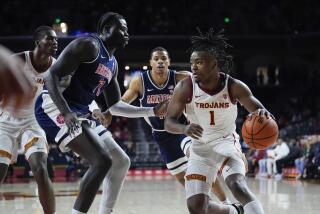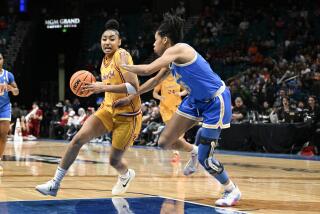Ethan Anderson’s back is better and so are USC’s chances in Pac-12
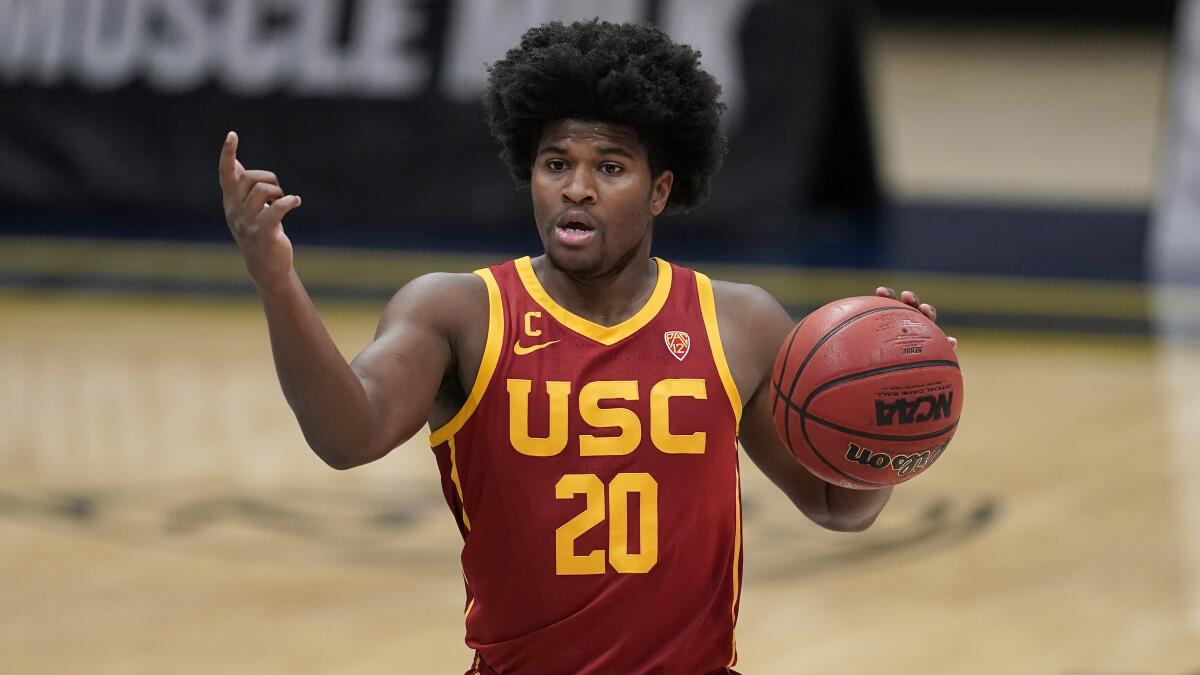
- Share via
When Ethan Anderson felt his lower back tighten up during an intrasquad scrimmage in early November, he didn’t think much of it. It was a familiar pain, one the point guard had worked through during high school. Just stretch, he told himself, and he’d be good the next day.
But weeks later, as USC’s basketball season tipped off, the pain lingered. Anderson played through it for the first two games, scoring a combined 20 points. He told himself it would get better. Then, USC got on a plane to Connecticut, and the pain became unbearable. He tried to play against Brigham Young but struggled just to bend over as pain shot up his spine. He checked himself out after nine minutes.
It would be six weeks until Anderson returned to the court and three weeks after that until he felt like himself again. Doctors offered little in the way of answers. Chiropractors weren’t helping. Coaches wondered if he would have to sit out the season. Anderson kept searching.
That’s when he discovered Rolfing.
A few weeks later, the sophomore was pain-free, scoring a career-high 19 points Saturday to push USC past UCLA and into a first-place tie with the Bruins in the Pac-12. The Trojans (15-3, 9-2 Pac-12) play at Washington on Thursday.
All thanks for his return, Anderson said, go to a Vermont man and an alternative form of deep-tissue bodywork dismissed by some as pseudoscience.
The Trojans’ rivalry victory over the Bruins was just another step forward in a long and ongoing climb toward greater things.
Rolfing has roots in the sports world; former Lakers coach Phil Jackson, who dealt with back issues of his own, is among those who have offered public support. Unlike chiropractic, which focuses on bones, or massage therapy, which focuses on muscle work, Rolfing is meant to manipulate the body’s fascia, the thin connective tissue surrounding muscles.
Rolfing, which surged in popularity in the 1970s, has its skeptics. Notably for its claims that certain physical manipulation can alter a person’s psychology. But Anderson was out of options when he got in touch with Greg Garcia of Bodywork Architectures, who traveled from Burlington, Vt., to Los Angeles to meet with him.
By then, after six weeks of sitting out, Anderson’s back had improved marginally. Shooting pain struck randomly. He was struggling to sleep.
“It would get better, but as soon as I worked out again, it would go back even worse,” Anderson said.
The day after he returned against Washington in January, playing 14 minutes and scoring three points, he was lying on a table for the first of six sessions with Garcia.
“It’s almost like a massage, but working on a different part of your body,” Anderson said. It felt like his back was being reconfigured.
Without him, USC was forced to weather its own two-month reconfiguration. Anderson was meant to be the floor general directing the offense. Instead, Santa Clara transfer Tahj Eaddy had stepped into that role and emerged as one of USC’s most consistent weapons.
USC rose to No. 20 in the AP men’s college basketball poll Monday on the heels of its victories over Stanford and previously ranked UCLA.
“The poise, the way he handles pressure, the way he takes his time in his spots, he’s so underrated,” Anderson said of Eaddy. “I’d trust him to get a basket at the end of the game, no matter what time it is.”
Anderson heeded that call Saturday. It wasn’t just his back that had improved, either. After spending the offseason working on shooting, he hit a career-high five three-pointers in the 66-48 victory over the Bruins.
“We just wanted him to get back at some point this season,” USC coach Andy Enfield said. “It’s a credit to Ethan. He’s a tough man, very mentally tough.”
That toughness was tested by the searing pain he once felt in his back. The thought of sitting out the season, Anderson said, crossed his mind.
But that’s no longer a concern. For Anderson and USC, everything feels aligned once again.
“I’m able to play now pain-free,” Anderson said. “It really did the trick.”
USC TONIGHT
AT WASHINGTON
When: 7.
Where: Alaska Airlines Arena, Seattle.
On the air: TV: Pac-12 Networks; Radio: 790.
Update: USC is riding high (four wins in a row and 10 of 11) after stomping UCLA on Saturday and could be ripe for a letdown as it takes to the road. The Huskies (3-14, 2-10) have won just twice since mid-December and are in 11th place in the Pac-12. But don’t be surprised if USC, which beat Washington 95-68 on Jan. 14, is slow to start in this one.
More to Read
Go beyond the scoreboard
Get the latest on L.A.'s teams in the daily Sports Report newsletter.
You may occasionally receive promotional content from the Los Angeles Times.

